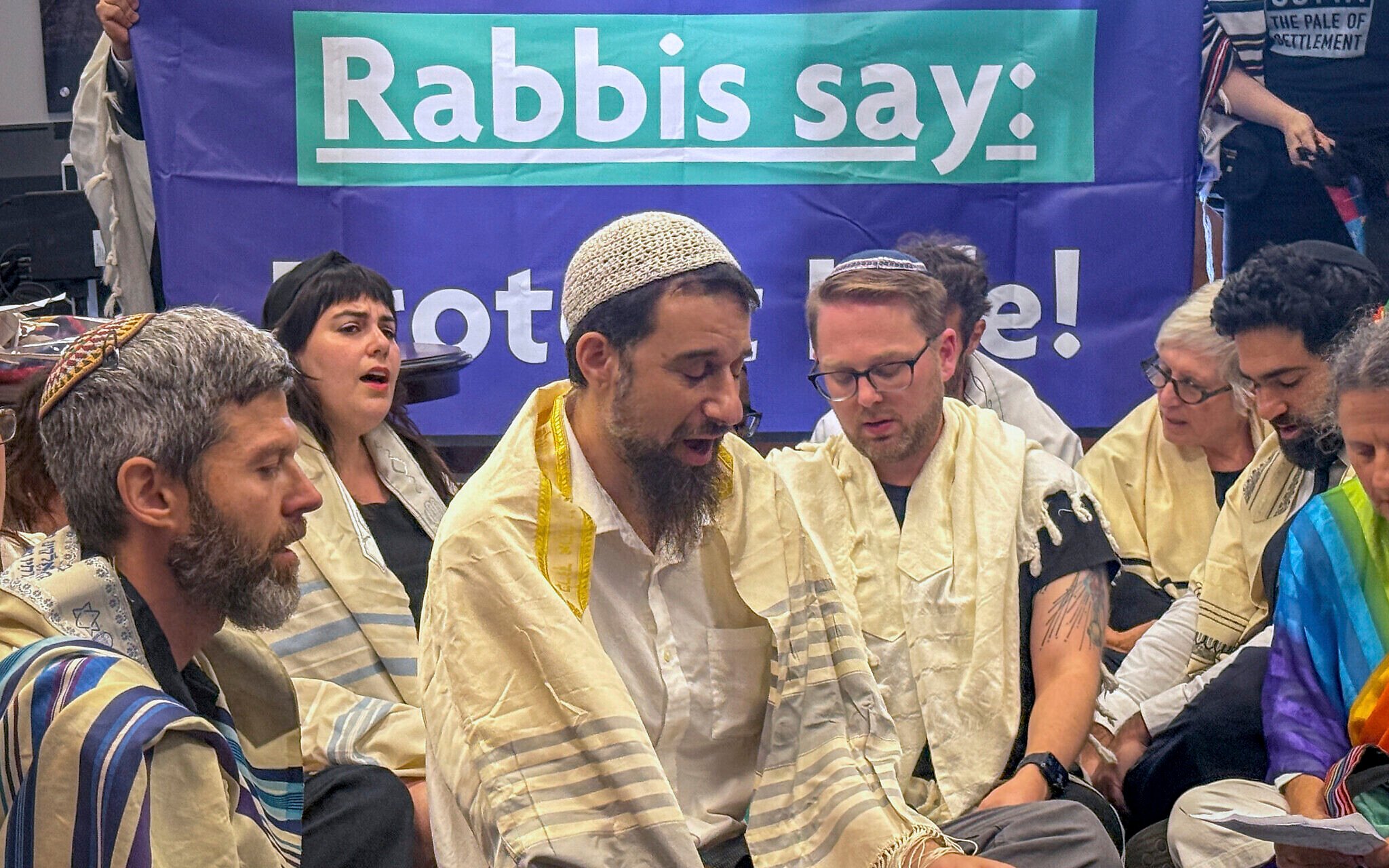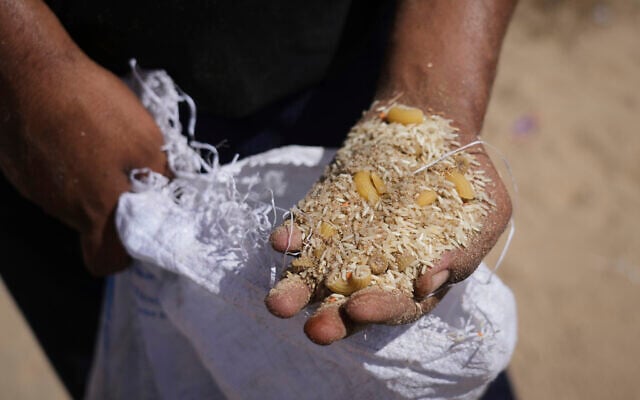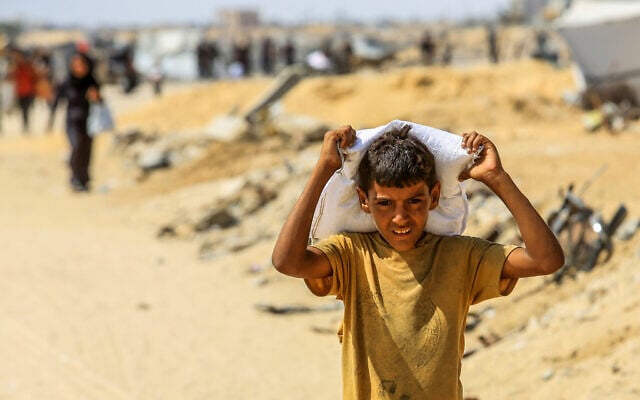



AP — For most Jewish Americans, whatever their political persuasion, support for Israel has been a bedrock principle. Thus, it’s notable that a broad swath of US Jews — reacting to the humanitarian crisis in Gaza — have been urging the Israeli government to do more to ensure the delivery of food and medicine.
There is no overwhelming consensus. On the left, some US Jews contend that Prime Minister Benjamin Netanyahu’s government is guilty of genocide — a charge that has been denied by Israel. On the right, some conservative Jewish news outlets have suggested that the widely verified food crisis in Gaza is a hoax.
What is clear is that the ranks of American Jews alarmed by the current conditions in Gaza have swelled and now include major organizations that customarily avoid critiques of Israeli policies.
The American Jewish Committee — a prominent advocacy group that strives to represent Jews in the US and abroad broadly — stressed in its statement that it “stands with Israel in its justified war to eliminate the threat posed by Hamas.”
“At the same time, we feel immense sorrow for the grave toll this war has taken on Palestinian civilians, and we are deeply concerned about worsening food insecurity in Gaza,” said the AJC, urging Israel and other key parties “to increase cooperation and coordination in order to ensure that humanitarian aid reaches Palestinian civilians in Gaza.”
The Rabbinical Assembly, a New York-based organization representing rabbis of the Conservative Movement, sounded a similar note.
“Even as we believe Hamas could end this suffering immediately through the release of the hostages and care for its civilian population, the Israeli government must do everything in its power to ensure humanitarian aid reaches those in need,” the assembly said. “The Jewish tradition calls upon us to ensure the provision of food, water, and medical supplies as a top priority.
Rabbi Moshe Hauer, executive vice president of the Orthodox Union, told The Associated Press he and his colleagues “are proud, sad, and angry. ”
“We remain proud of Israel and its army, the only moral fighting force in the region striving to abide by internationally accepted laws of war,” he said via email. “We are genuinely sad about the mounting human costs which — as intended by Hamas — this war is inflicting on Israelis and innocent Palestinians. And we are angry at those who only ascribe to Israel the worst intentions and all responsibility while ignoring Hamas’ inhumanity.”
A spokesman for the American Israel Public Affairs Committee, the staunchly pro-Israel group better known as AIPAC, welcomed Israel’s latest moves to boost aid to Gaza.
“The true key to improving the humanitarian conditions is for Hamas to surrender power and free all 50 hostages, including the 2 Americans,” Marshall Wittmann said via email.
Of major nationwide organizations, perhaps the most vehement statement came from the Reform Jewish Movement, which represents the largest branch of Judaism in the US.
“Hamas has repeatedly demonstrated its willingness to sacrifice the Palestinian people in its pursuit of Israel’s destruction, but Israel must not sacrifice its own moral standing in return,” the Reform statement said.
“No one should be unaffected by the pervasive hunger experienced by thousands of Gazans,” it continued. “Nor should we accept arguments that because Hamas is the primary reason many Gazans are either starving or on the verge of starving, that the Jewish State is not also culpable in this human disaster.”
Over the past few weeks, as images and reports of starvation and violence in Gaza dominated the news cycle, Rabbi Jon Roos felt a shift in how the Israel-Hamas war is discussed in Jewish circles.
“There was a real change in the tone of the conversation, but also in the depth and content of it,” said Roos, who leads Temple Sinai, a Reform synagogue in Washington, DC. “I felt it from members of the congregation. I’ve felt it in the Jewish communal world.”
The clergy of Temple Sinai signed onto a letter with more than 1,000 Jewish clergy calling on the Israeli government to “allow extensive humanitarian aid” to enter Gaza. It stated that “we cannot condone the mass killings of civilians … or the use of starvation as a weapon of war.”
Roos said the Jewish community can hold two truths at once: that October 7 was deplorable, and so is the situation in Gaza.
“One of the critical parts of Judaism is that we really value that ability to hold nuance and two truths, even if they’re both incredibly challenging and self-critical,” Roos said.
Rabbi Aaron Weininger in Minnetonka, Minnesota, also signed the clergy letter. He leads Adath Jeshurun, a Conservative Jewish congregation.
“Zionism is big enough and strong enough to care about the safety, wellbeing, and dignity of Israelis and Palestinians. Naming their suffering doesn’t weaken Zionism nor does calling on members of the government not to occupy Gaza. Signing the letter honors Zionism as compassionate and just,” he wrote in an email.
The response of his community has been largely positive, with some disagreement — “both with the idea of publicly disagreeing with the Israeli government and with the characterization of suffering in Gaza,” he wrote. “But taking moral stands and holding disagreement have always been part of what it means to be a faith community.”
On Tuesday, more than two dozen rabbis were arrested in the office of the Senate majority leader, John Thune, a South Dakota Republican, while demanding action by Congress to provide food aid for Gaza.
“All life is sacred, but Palestinian lives are not treated as such, and that is a blot on our collective humanity,” said one of the protesters, Alissa Wise, who is the founding director of Rabbis for Ceasefire. “We are here to insist on the sanctity of life of every Palestinian, of every Israeli, of all of us.”
Also arrested was a New York-based rabbi, Andrue Kahn. He is the executive director of the American Council for Judaism, which rejects the concept of Zionism.
In an email, Kahn said an increasing number of US Jews, including rabbis, are now more willing to speak out about Gaza’s plight and demand policy changes from Israel.
“The horrors of starvation of so many people … has led to the dam bursting for many people, and the political spectrum of those speaking out has broadened,” he wrote.
A Jewish member of Congress, Rep. Randy Fine, a Florida Republican, incurred criticism after suggesting in a post on X last week that the reports of a Gaza food crisis were false.
“Release the hostages. Until then, starve away. (This is all a lie anyway. It amazes me that the media continues to regurgitate Muslim terror propaganda.),” his post said.
Two US-based Jewish news outlets have also depicted the food crisis as exaggerated.
“The reality is clear — food and medicine are entering Gaza, but Hamas seizes them for its own purposes. The international community’s fixation on blaming Israel ignores this fundamental truth,” said an article in The Jewish Voice.
Supplementing its news articles, making similar points, the Jewish News Syndicate on Wednesday ran a column by Mitchell Bard, executive director of the American-Israeli Cooperative Enterprise.
“True supporters of Israel are not fair-weather friends who abandon their ally out of fear of what their friends will think of them or the need to feign moral superiority,” he wrote. “Israelis are not children in need of a public scolding from the Diaspora. They need solidarity, not sanctimony.”
Times of Israel staff contributed to this report.




